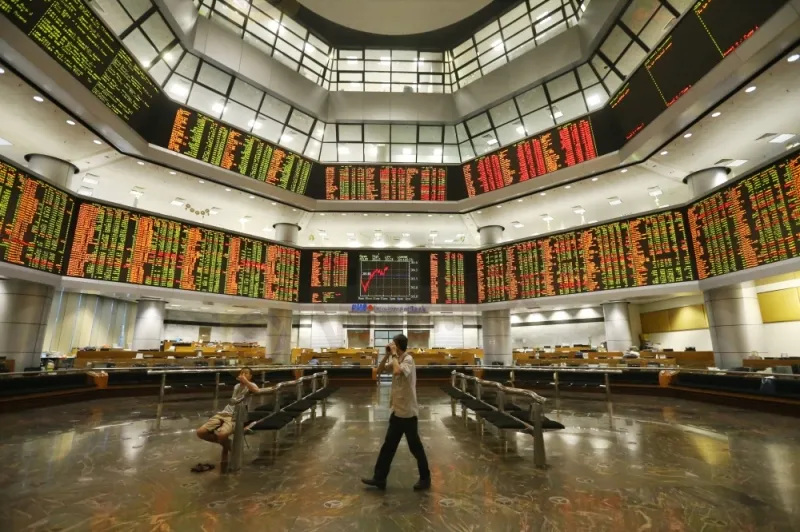简体中文
繁體中文
English
Pусский
日本語
ภาษาไทย
Tiếng Việt
Bahasa Indonesia
Español
हिन्दी
Filippiiniläinen
Français
Deutsch
Português
Türkçe
한국어
العربية
Bursa Malaysia opens lower due to profit taking
Abstract:The broader market experienced a negative trend with decliners outnumbering advancers at 147 to 126. Additionally, 260 counters remained unchanged, 1,732 were untraded, and 17 others were suspended.

KUALA LUMPUR, August 2 — Bursa Malaysia started the day on a lower note as investors continued profit-taking, influenced by Wall Street's mixed performance in the previous session.
As of 9.10am, the FTSE Bursa Malaysia KLCI (FBM KLCI) declined by 2.99 points to 1,448.25 from Tuesday's closing level of 1,451.24.
The main index started the day with a decline of 1.79 points at 1,449.45.
In the broader market, decliners outnumbered advancers with a ratio of 147 to 126, while 260 counters remained unchanged, 1,732 were untraded, and 17 others were suspended.
The total turnover amounted to 203.32 million units valued at RM89.52 million.
Malacca Securities Sdn Bhd reported that Wall Street concluded with a mixed performance, as the Dow Jones Index recorded a modest 0.2 percent gain, while the S&P 500 and Nasdaq declined by 0.3 percent and 0.4 percent, respectively. This outcome was attributed to the varied results of corporate earnings.
In Malaysia, the S&P Global Malaysia Manufacturing PMI for July 2023 recorded a reading of 47.8, indicating a continued slowdown in business conditions with a recovery in demand still some distance away.
Despite the challenging conditions, analysts view the current pullback as a healthy correction, allowing the market to digest recent gains.
Furthermore, the lower liners in the market are undergoing a consolidation phase as traders adopt a cautious approach and adopt a wait-and-see stance ahead of the state election, according to the brokerage's note.
Regarding sector performance, defensive sectors like healthcare, utilities, and REITs may come into focus amid emerging signs of volatility. On the other hand, the technology sector may mirror the weakness seen in the Nasdaq overnight.
Among the heavyweight stocks, Maybank declined four sen to RM8.95, CIMB fell five sen to RM5.47, Tenaga Nasional slid two sen to RM9.53, and Petronas Chemicals decreased six sen to RM6.79. Meanwhile, Public Bank remained unchanged at RM4.12.
In terms of active stocks, Revenue, Advance Synergy, and Widad each saw an increase of half-a-sen to 26.5 sen, 16.5 sen, and 43 sen, respectively. Tanco and its warrants remained unchanged at 54.5 sen and 22.5 sen, respectively.
On the index board, there were declines observed in several indices: the FBM Emas Index dropped 18.74 points to 10,639.83, the FBMT 100 Index decreased 18.74 points to 10,333.71, the FBM Emas Shariah Index weakened 15.20 points to 10,907.59, the FBM ACE Index eased 13.65 points to 5,293.76, and the FBM 70 Index declined 14.43 points to 13,956.78.
In terms of sectors, the Plantation Index saw a decline of 6.20 points to 7,138.21, the Industrial Products and Services Index reduced by 0.43 of a point to 167.14, and the Financial Services Index slid by 47.52 points to 16,144.74. However, the Energy Index showed a slight increase of 4.64 points to 837.75.

Disclaimer:
The views in this article only represent the author's personal views, and do not constitute investment advice on this platform. This platform does not guarantee the accuracy, completeness and timeliness of the information in the article, and will not be liable for any loss caused by the use of or reliance on the information in the article.
Read more

Why Investors Are Focusing on the US Bond Market Right Now
The US bond market's recent volatility is raising concerns. Learn why investors are paying close attention and how it may affect US tariffs and the economy.

Are We in a Retracement Or the Start of a Financial Collapse?
As markets fluctuation in uncertain times and headlines grow darker, investors are left asking a crucial question: Is this a temporary downturn or something far worse? The terms bear market, recession, and depression are often thrown around interchangeably, but they represent very different levels of economic pain. Read this article to understand the differences between all three.

No Recession in Forex? Is Forex Better Than the Stock Market?
As equity markets recently convulse under the pressure of rate uncertainty, geopolitical risk, and weakening macroeconomic signals, an age-old question resurfaces: when the stock market shakes, is it time to look elsewhere?

Global Panic Builds as Forex Shifts into Risk-Off Mode
Global markets plunged into a broad sell-off today, with U.S. equities, crypto assets, and various indexes all sharply lower as risk-off sentiment intensified. The forex market followed suit, shifting into “safe-haven mode” — the Japanese yen and Swiss franc surged, while risk-sensitive currencies like the Australian dollar, New Zealand dollar, and Canadian dollar came under heavy pressure. Tariff concerns acted as the trigger, prompting capital rotation and a clear shift in market structure.
WikiFX Broker
Latest News
eXch Exchange to Shut Down on May 1 Following Laundering Allegations
How a Viral TikTok Scam Cost a Retiree Over RM300,000
JT Capital Markets Review
FCA Proposes Simplifying Investment Cost Disclosure for Retail Investors
Fresh Look, Same Trust – INGOT Brokers Rebrands its Website
FCA Issues Alerts Against Unauthorised and Clone Firms in the UK
Consob Orders Blackout of 9 Fraudulent Financial Websites
Tradu Joins TradingView for Seamless CFD and Forex Trading
Japan Issues Urgent Warning on $700M Unauthorized Trades
Silver surges past $33—are you ready for what comes next?
Currency Calculator


